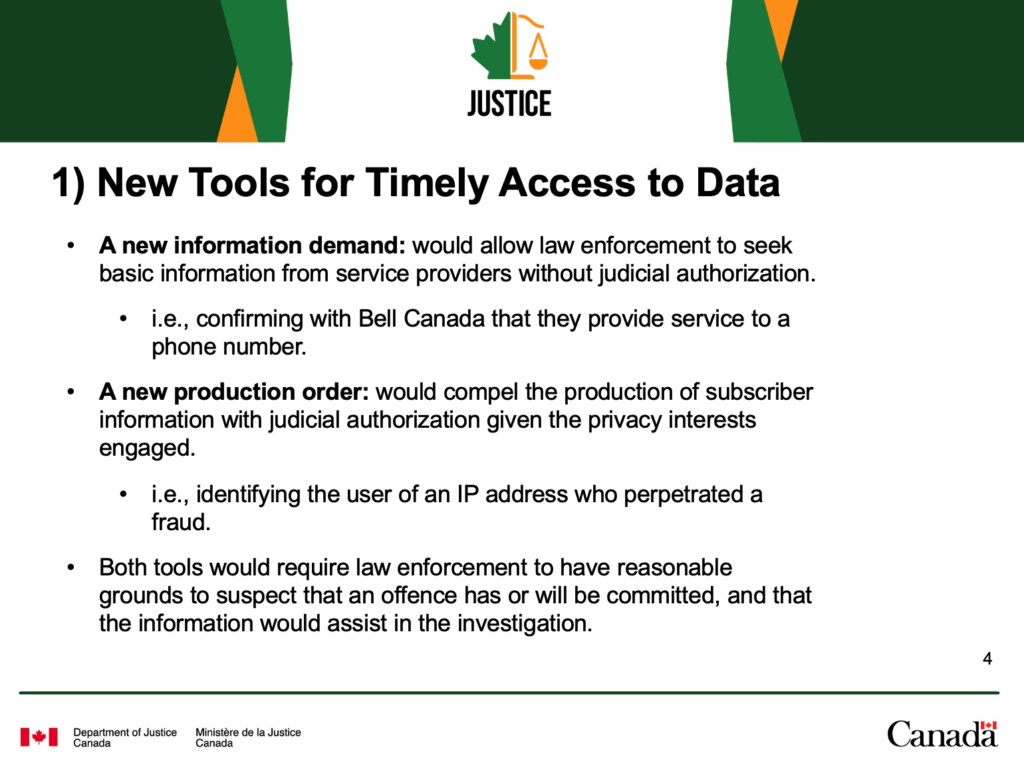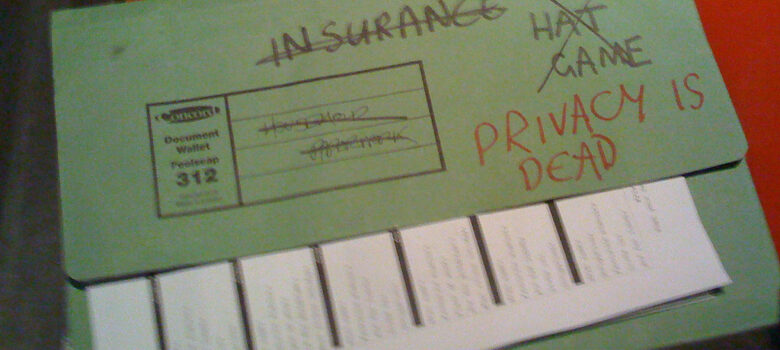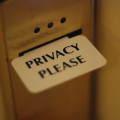The government’s inclusion of warrantless information demand powers in Bill C-2 may make this the most dangerous lawful access proposal yet, exceeding even the 2010 bill led by Conservative Public Safety Minister Vic Toews. The initial concern regarding the bill’s warrantless disclosure demand unsurprisingly focused on whether the proposal was consistent with Supreme Court of Canada jurisprudence upholding the reasonable expectation of privacy in basic subscriber information (there is a strong argument it is not). The application of this new power was generally framed as a matter for telecom and Internet companies, given that companies such as Bell, Rogers, and Telus are typically the focal point for law enforcement seeking information on subscriber activity. However, it has become increasingly apparent that this is an overly restrictive reading of the provision. The Bill C-2 information demand power doesn’t just target telecom providers. It targets everyone who provides services with the prospect of near limitless targets for warrantless disclosure demands.
This broader reading was first raised by NDP MP Jenny Kwan, who stated in debate on June 11, 2025:
Bill C-2 is a sweeping attack on Canadian civil liberties. It would allow the RCMP and CSIS to make information demands from internet providers, banks, doctors, landlords and even therapists, without judicial oversight. This is not about border security. It is about government overreach and Big Brother tactics, plain and simple. It is a violation of our privacy, and it will be challenged in court.
The Globe and Mail picked up on this concern earlier this week, quoting the CCLA in reference to the warrantless access demands to physicians, abortion clinics, and hotels.
Lawful access had traditionally focused solely on telecom and Internet providers. For example, Bill C-30, the 2010 Toews’ lawful access bill, included a definition for “telecommunications service providers” and limited the subscriber information disclosure requirements to them. The Department of Justice materials on Bill C-2 state that the new power as “would allow law enforcement to seek basic information from service providers without judicial authorization”, citing as an example confirming with Bell Canada that they provide service to a phone number.

Department of Justice Bill C-2 Technical Briefing Deck, page 4
The problem is that the information demand power in Bill C-2 is not limited to telecom service providers. The bill includes a definition for an “electronic service provider” and a “core provider” but those definitions are not used in the section that establishes the information demand power. Rather, they apply to new requirements for those providers to support law enforcement by granting access to their networks.
The information demand power applies literally to anyone who provides services to the public:
A peace officer or public officer may make a demand in Form 5.0011 to a person who provides services to the public requiring the person to provide, in the form, manner and time specified in the demand, the following information
There is no definition or obvious limitation on the services in question or the person who provides them – it could be a telecom provider, physician, hospital, library, educational institution, or financial institution. But why stop there? The provision is so broad that your dry cleaner or barber are captured by it. If served with the appropriate form, anyone who provides services is required to confirm whether they have provided services to any subscriber, client, account, or identifier. They must also disclose whether they have any information about the subscriber, client, account or identifier as well as advise where and when they provided the service. On top of that, they must advise when they started providing the service and list the names of any other person that may have provided other services.
All of this information can be demanded without a warrant or court oversight. The person disclosing the information is barred from revealing the disclosure for a year and has only five days in which they can challenge the demand. Law enforcement must only have “reasonable grounds to suspect” that an offence has been or will be committed under any Act of Parliament. This is the lowest possible standard and the broadest possible scope extending far beyond just the Criminal Code.
The entire Bill C-2 approach represents a dramatic expansion in the notion of lawful access, moving from telecom providers to all service providers in what Kwan appropriately called “Big Brother tactics”. To bury such provisions in a border bill after repeated Supreme Court of Canada decisions affirming the privacy rights of Canadians is an absolute assault on those rights that must be firmly rejected.












Thanks for covering this, Michael.
“a person who provides services to the public” is frighteningly broad.
Seems like it could also cover journalists, academics, etc.
Over 300 organizations are Petitioning and had a Press conference not televised or even spoken about on CBC.
Some notable members; YMCA Canada, Canadian Women’s Foundation, Canadian Labour Congress, The United Church of Canada, Oxfam Canada, Canadian Civil Liberties Association.
Petitioning against BillC-2? Good to know and yes definitely, criminially under reported.
Pingback: Border Bill Powers Would Allow Warrantless Police Requests to ‘Public Services’ of All Types – Pixel Envy
Companies want the rule of law just like the majority of Canadians. Law abiding citizens will not be impacted by this. Companies just don’t want to pay their employees to prepare the data for police.
How short-sighted of you.
Law abiding citizens won’t be affected? You could be detained for any reason with this type of legislation. We have oversight with police because they abuse their power. The countless cases against RCMP for harassment is astounding. Our country has one of the lowest oversight and conviction rate regarding law enforcement abuse of force.
I would like to state there is full support to pass this legislation.
“We have an administration that is very focused on and putting a great deal of energy into dealing with those issues. I look forward to this legislation passing and going to committee. I know there are people who have concerns. At the end of the day, some of that concern comes from, I would suggest, misinformation from the Conservative Party.” This is a direct quote from a Liberal constituent using political division and defamation to undermine the severity of having a police force that is not subject to court procedural investigation. Warrants are issued for probable cause, and we have a Supreme Court that oversees those measures are followed otherwise there is no reign on the abuse of powers. This bill also specifies any legal action towards warrantless arrests cannot be tried in civil court, whether it be a lawsuit etc. That means these law enforcement agencies have absolutely no consequential penalties for any of their actions regarding personal vilification and incrimination.
Why on earth would anyone think this is a great law to pass? They are intentionally burying media outlets releasing articles opposing this information, including the Toronto Star’s non-partisan outlook. The fact so many legal firms throughout the country and other organizations have opposed this bill is enough cause to showcase the severity and breach of human rights. If we are not only monitored relentlessly, but then imprisoned without probable reason – what’s next?
Wake up people.
> Why on earth would anyone think this is a great law to pass?
I suspect that it’s because it’s psychologically and intellectually far easier to blame everything on the street criminals than to admit that the mess we’re in is the result of the bad social and economical policies we passionately voted for.
Pingback: Lawful Access on Steroids: Why Bill C-2’s Big Brother Tactics Combine Expansive Warrantless Disclosure with Unprecedented Secrecy – Selfpos
Join the world map guessing challenge and locate countries with precision.
This is deeply troubling. Warrantless demands under Bill C-2 could reach anyone—from telecoms to Tunnel Rush Game dry cleaners—eroding privacy without judicial oversight. That’s a step too far.